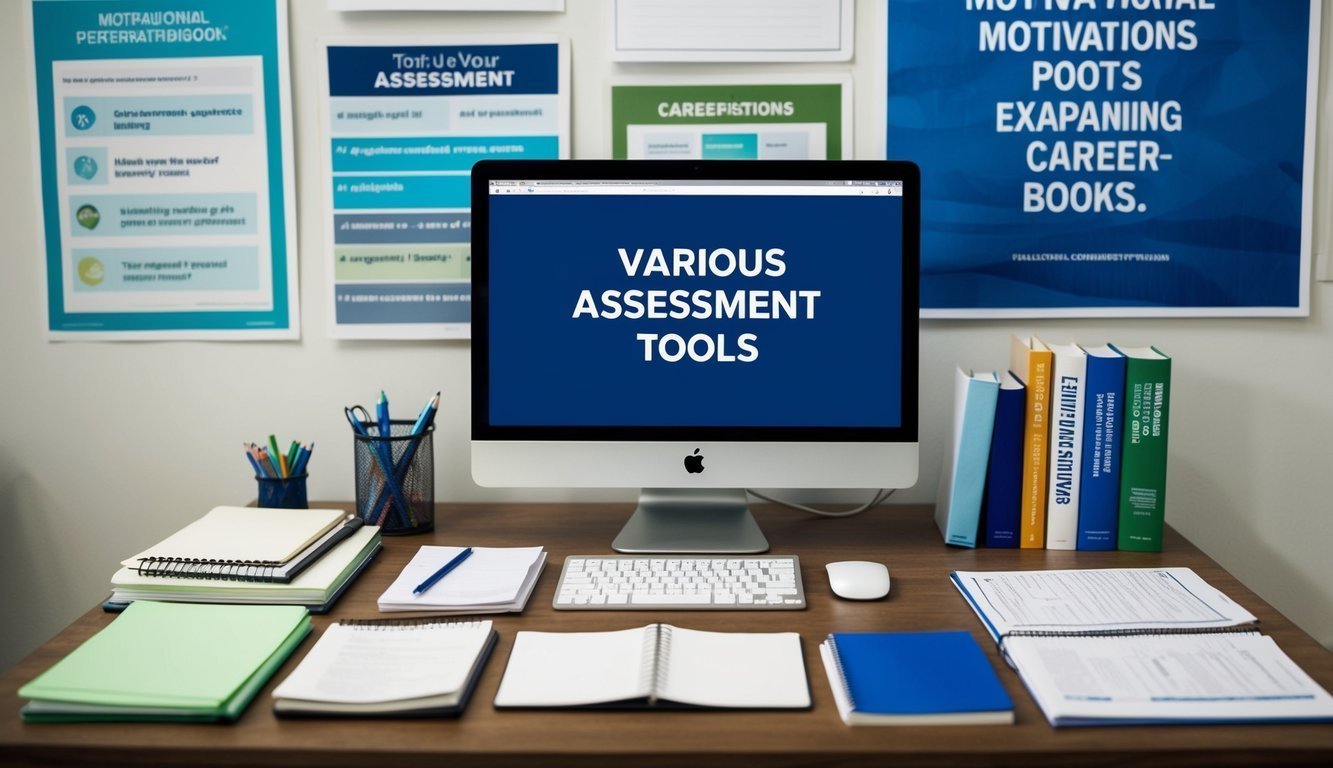PsychNewsDaily Publishers
100 Summit Drive
Burlington, MA, 01803
Telephone: (320) 349-2484
PsychNewsDaily Publishers
100 Summit Drive
Burlington, MA, 01803
Telephone: (320) 349-2484
Self-assessment fosters personal growth by enhancing self-awareness, identifying strengths and weaknesses, and guiding individuals in setting realistic goals for professional development and lifelong learning.


Self-assessment is an essential component of personal growth and development. It entails reflecting on one’s own skills, actions, and attitudes to gain insight and facilitate improvement.
Self-awareness is fundamental to effective self-assessment, as it involves understanding one’s thoughts, feelings, and behaviors. This awareness enables individuals to measure their comprehension and learning, thereby establishing a foundation for self-growth.
Those who possess self-awareness can more accurately pinpoint their strengths and areas for improvement. This knowledge empowers them to set realistic goals and make informed choices regarding their personal and professional development.
To cultivate self-awareness, individuals should engage in regular reflection and introspection. Practices such as mindfulness meditation, keeping a journal, and soliciting feedback from others can significantly boost self-awareness.
Numerous self-assessment tools are available to assist individuals in evaluating various facets of their lives. These tools can be classified into:
Each of these tools has a distinct purpose and can yield valuable insight into different aspects of personal development. Some focus on pinpointing strengths and weaknesses, while others assist individuals in understanding their values and motivations.
Engaging in personal self-assessment provides numerous benefits for individual advancement and success. It allows individuals to:
Self-assessment also enables learners to gauge their understanding and offers immediate feedback. This prompt insight assists individuals in adjusting their learning methods or behaviors in a timely manner.
Regular self-assessment nurtures a growth mindset, encouraging individuals to embrace challenges as opportunities for development. It also instills a sense of accountability and personal responsibility for their own advancement.

Personality and career assessment tools offer valuable insights into individual traits, preferences, and potential career directions. These assessments aid individuals in gaining self-awareness and making educated decisions about their career paths.
The Myers-Briggs Type Indicator (MBTI) is a well-known personality assessment tool that categorizes individuals into 16 personality types based on four dichotomies: Extraversion/Introversion, Sensing/Intuition, Thinking/Feeling, and Judging/Perceiving.
The MBTI assists individuals in understanding their natural tendencies and strengths in various aspects of life, including their work. It can help inform career choices by identifying professions compatible with specific personality types.
For instance, an ENFJ (Extraverted, Intuitive, Feeling, Judging) type may excel in careers related to counseling, education, or human resources. The MBTI provides a framework for comprehending interpersonal dynamics and communication styles in a professional setting.
The Keirsey Temperament Sorter closely relates to the MBTI but focuses on four temperaments: Artisan, Guardian, Idealist, and Rational. Each temperament has unique traits and values that shape career preferences.
Artisans are proactive and adaptable, often thriving in roles that involve creativity or hands-on work. Guardians value stability and tradition, making them well-suited for positions in administration, management, or law enforcement.
Idealists focus on personal growth and helping others, often excelling in counseling, teaching, or non-profit organizations. Lastly, Rationals are analytical thinkers, typically attracted to fields like science, technology, or strategic planning.
The 16 Personalities Test is a contemporary adaptation of the MBTI, incorporating elements from the Big Five personality traits. It classifies individuals into 16 personality types, each denoted by a four-letter code and a role.
This assessment delivers comprehensive insights into various personality dimensions, including strengths, weaknesses, romantic relationships, friendships, parenting, and career paths. The results provide specific career recommendations based on personality type.
For example, an INTP (Logician) might be well-suited for career opportunities in programming, systems analysis, or scientific research. The test also offers guidance on work habits, communication styles, and possible avenues for personal development.
The Strong Interest Inventory concentrates on career interests and preferences rather than personality traits. It evaluates interests across six overarching themes: Realistic, Investigative, Artistic, Social, Enterprising, and Conventional (RIASEC).
This assessment assists individuals in identifying potential careers that resonate with their interests and values. It compares personal interests to those of professionals in various sectors, providing a list of occupations that may be fulfilling.
Furthermore, the Strong Interest Inventory explores work and learning environments, risk-taking tendencies, and leadership styles. This comprehensive approach supports career exploration, development, and decision-making.

Self-assessment tools are pivotal in acknowledging one’s abilities and encouraging career progression. These tools provide insights that guide individuals towards targeted growth opportunities.
Self-assessment instruments enable individuals to identify their strengths and improvement areas. These evaluations often cover technical skills, soft skills, and industry-specific expertise. Common approaches include online questionnaires, 360-degree feedback assessments, skills inventories, and personality tests.
The insights gained from these assessments can aid in revising resumes and showcasing transferable skills. It is vital to approach self-assessment with honesty and objectivity to obtain accurate results.
Regular evaluations of skills permit professionals to track their progress and adapt to evolving industry standards. This proactive strategy ensures individuals remain competitive in their chosen fields.
The results of self-assessments can shape a roadmap for professional development. By recognizing gaps in knowledge or skills, individuals can design targeted improvement plans.
Crucial steps in this process include:
Professionals should align their development objectives with their career ambitions and industry trends. This alignment ensures that growth efforts make a meaningful contribution to their professional advancement.
Regular reassessment is vital for tracking progress and fine-tuning development plans as necessary. It is essential to view professional growth as an ongoing journey rather than a one-off event.
Training programs present structured opportunities for skill enhancement and personal development. These programs can vary from brief workshops to extensive certification courses.
Effective training initiatives commonly include:
Individuals should look for programs that target their identified skills gaps and career aspirations. Combining formal training with self-directed learning activities often yields the best results.
Personal development encompasses more than just formal training. Engaging with industry literature, attending conferences, and participating in professional associations can complement structured programs effectively. Maintaining continuous learning and adaptability is crucial for long-term career success.

Choosing the right career requires a match between personal characteristics and job requirements. Self-assessment tools can help individuals pinpoint their strengths, interests, and values to make informed career choices.
Career matching tools utilize algorithms to compare individual traits with job specifications. These assessments consider skills, personality, and work preferences. The O*NET database is an extensive resource that aligns abilities with various occupations.
Numerous online platforms offer career matching services, typically including questionnaires about work activities, interests, and values. The results propose possible career paths based on the individual’s profile.
It is important to understand that while these tools deliver meaningful insights, they should serve as a foundational step in career exploration rather than definitive conclusions.
Career fit denotes how well an individual’s attributes align with job requirements. A strong fit often correlates with greater job satisfaction and improved performance. Self-assessment tools can illuminate personal traits key to career success.
Factors affecting career fit comprise:
Regular self-reflection and reassessment will help individuals maintain career satisfaction as their goals and situations evolve.
Career clusters group similar occupations based on common skills and knowledge requirements. Interest assessments assist individuals in identifying which clusters resonate with their preferences. The CareerMAPP test is one such tool that connects respondents with potential careers based on their characteristics.
Common career clusters include:
Exploring various clusters can expand career horizons and uncover unexpected possibilities. Researching specific roles within appealing clusters can provide deeper insights into prospective career pathways.

Self-assessment tools yield invaluable insights for personal and professional advancement. Effective goal-setting empowers individuals to forge meaningful career trajectories, boost motivation, and nurture lifelong learning habits.
A well-defined career pathway is vital for sustained success. Self-assessment findings can highlight both strengths and areas needing development, directing individuals towards fitting career options.
To construct an effective career pathway:
Utilizing career planning tools can aid in visualizing progress and modifying goals as needed. Regular check-ins ensure alignment between aspirations and career growth opportunities.
Motivation is critical for achieving objectives and maintaining momentum. Self-assessment instruments like the High5 test can uncover intrinsic motivators and strengths.
To enhance motivation:
Consistent reassessment of motivation levels enables individuals to remain engaged and committed to their growth journey. Adjusting strategies in response to changing circumstances or interests is essential for ongoing progress.
Continuous learning is crucial for personal development and career advancement. Self-assessment tools can pinpoint knowledge deficiencies and preferred learning approaches, guiding effective learning strategies.
Key elements of lifelong learning planning include:
Regular self-evaluation allows individuals to adapt their learning plans as industry trends and personal interests shift. Embracing a growth mindset fosters resilience and adaptability in an ever-evolving professional landscape.
“`